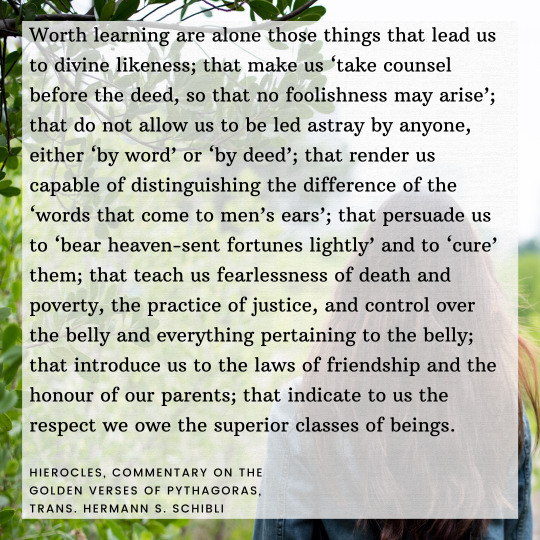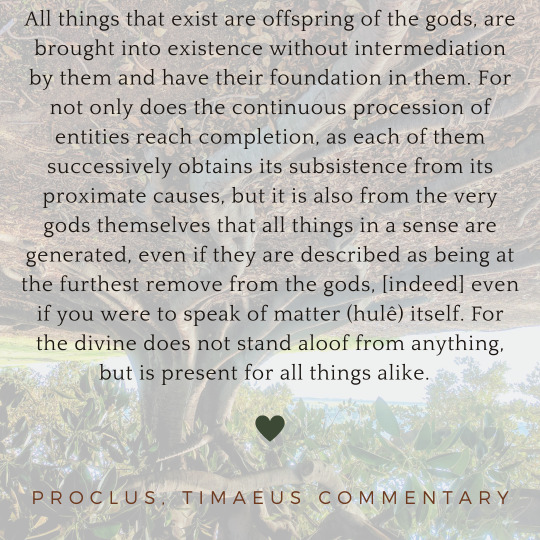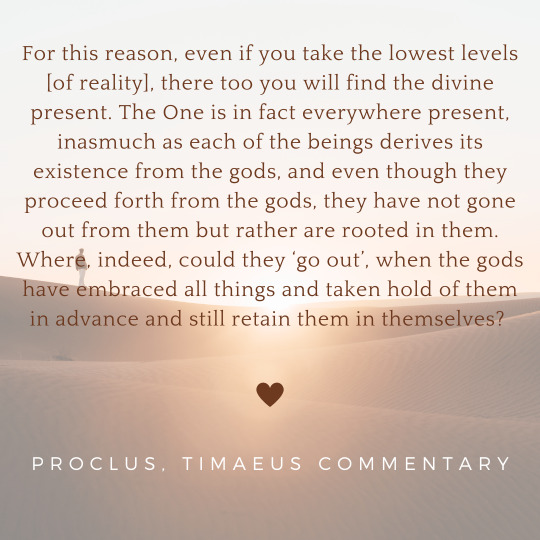Images with quotations from Platonists and loose excerpts from the free, no-strings-attached, downloadable book SOUL'S INNER STATUES: https://kayeofswords.github.io/soulsinnerstatues/
Don't wanna be here? Send us removal request.
Text
💕💞💗💖
In Platonism, the Gods have something called providential love (eros pronoetikos) for us — a type of care flowing without cease and without boundaries to all who are open to receiving it.
11 notes
·
View notes
Text
The Gods care about us.
Whatever happens in our lives, the Gods care about us, and the universe is the most beautiful and blessed Goddess, a temple and a hymn to all that is.

Background image of the Goddess of Justice. Text reads, “The Gods are on our side — as also are the guardian spirits — and we in turn are the property of the Gods and guardian spirits. What is fatal for us is injustice, and arrogance allied to folly; our salvation is justice, and self-control allied to wisdom, and these are to be found dwelling in the living powers of the Gods — though they can also be seen dwelling in us, just a bit — or something very like them.” Plato, Laws, Book 10, 906b
1 note
·
View note
Text
The Gods are not their myths, and they crown the totality of the cosmos, not just Earth. They are the preface to existence, and what they have lain down forms the scaffolding of everything we see in the universe.
2 notes
·
View notes
Text
We are each, at our core, a one, and the flower at the core of us is always connected to the God we are suspended from; we are, at our periphery, dazzled by and participating in the amalgam of divine delights, a reflection in water of the Gods’ shared feast in the Phaedrus.
2 notes
·
View notes
Text

Background is a woman walking through a verdant area with trees and bushes. Text reads, “Worth learning are alone those things that lead us to divine likeness; that make us ‘take counsel before the deed, so that no foolishness may arise’; that do not allow us to be led astray by anyone, either ‘by word’ or ‘by deed’; that render us capable of distinguishing the difference of the ‘words that come to men’s ears’; that persuade us to ‘bear heaven-sent fortunes lightly’ and to ‘cure’ them; that teach us fearlessness of death and poverty, the practice of justice, and control over the belly and everything pertaining to the belly; that introduce us to the laws of friendship and the honour of our parents; that indicate to us the respect we owe the superior classes of beings.” Hierocles, Commentary on the golden verses of Pythagoras, trans. Hermann S. Schibli.
#hierocles#pythagorean#platonism#polytheism#going for virtue#let's all make the world a better place#cultivating moderation courage and prudence leads to justice
0 notes
Text
🌒
“Chance led Proclus to hear first Syrianus, son of Philoxenus, at whose lecture was present Lachares, who was profoundly versed in the doctrines of the philosophers, and at that time was an assiduous auditor of the philosopher, although his art in sophistry excited as much admiration as Homer’s in poetry. It happened to be late dusk, and the sun was setting during their conversation, and the moon, quitting her conjunction with the sun, began to appear. So as to be able to adore the goddess alone and leisurely, they tried to dismiss the youth who to them was a stranger. But, after having taken but a few steps from the house Proclus, — he also seeing the moon leaving her celestial house — stopped in his tracks, undid his shoes, and in plain sight of them adored the goddess. Struck by the free and bold action of the youth, Lachares then said to Syrianus this admirable expression of Plato’s about geniuses: “Here is a man who will be a great good, or its contrary!” Such are the presages, — to mention only a few of them — that the gods sent to our philosopher just as he arrived in Athens.”
PROCLUS, OR CONCERNING HAPPINESS, Marinus of Samaria, trans. Kenneth S. Guthrie.
0 notes
Text
It's OK to only worship a few Gods.
It is not necessary to worship every single God every day (that would be impossible), just as one cannot be friends with every human being in the world or every sentient being in the cosmos. Most people only have the bandwidth for worshipping a few, and that's okay.
#polytheism#worshipping at home#most of us do not have immense bandwidth#life is complicated but the Gods are always there for us
0 notes
Text



All things that exist are offspring of the gods, are brought into existence without intermediation by them and have their foundation in them. For not only does the continuous procession of entities reach completion, as each of them successively obtains its subsistence from its proximate causes, but it is also from the very gods themselves that all things in a sense are generated, even if they are described as being at the furthest remove from the gods, [indeed] even if you were to speak of matter (hulê) itself. For the divine does not stand aloof from anything, but is present for all things alike.
For this reason, even if you take the lowest levels [of reality], there too you will find the divine present. The One is in fact everywhere present, inasmuch as each of the beings derives its existence from the gods, and even though they proceed forth from the gods, they have not gone out from them but rather are rooted in them. Where, indeed, could they ‘go out’, when the gods have embraced all things and taken hold of them in advance and still retain them in themselves?
For what is beyond the gods is that which is in no way existent, but all beings have been embraced in a circle by the gods and exist in them. In a wonderful way, therefore, all things both have and have not proceeded forth. They have not been cut off from the gods. If they had been cut off, they would not even exist, because all the offspring, once they were wrenched away from their fathers, would immediately hasten towards the gaping void of non-being. In fact they are somehow established in them [the gods], and, to put the matter in a nutshell, they have proceeded of their own accord, but [at the same time] they remain in the gods.
Proclus, Timaeus commentary
#proclus#polytheism#all things remain in the Gods#every God is Good#we are embraced in a circle by the Gods#theology
5 notes
·
View notes
Text

Background image is a microphone. Text reads, “In each of us, there lives the ambition of an Alcibiades, which we must discipline and train for something better.” Anonymous Prolegomena to Platonic Philosophy, ϴ' 23.23-25.
Alcibiades I, the beginning of the Iamblichean sequence of Platonic dialogues for a very good reason.
0 notes
Text





Proclus, On the Timaeus of Plato, Book 5, 324.5-24
This very topic should be investigated from the very beginning, asking why it is that the soul comes down into bodies. It is because it wants to imitate the providential care of the Gods, and it enters into generation on this account, abandoning contemplation.
For, given that divine perfection is of two kinds, the one intellective, and the other providential, the former involving rest and the latter motion, their static, intellective, and undeviating nature is reflected through the soul's contemplation, while their providential and motive power is reflected in its generation-working life.
And just as this intellection is particular, so too their providential care is particular, and as an individual soul it occupies itself with an individual body. Furthermore it is contributing to the perfection of the cosmos.
For there must not only be immortal and intellective animals, as there are among the Gods, nor only mortal and non-rational ones of the same kind as the last animals in the creation process, but also all the animals between these, ones that are not at all immortal but are able to partake of reason and intellection.
There are many such animals spread across many sectors of the cosmos, because it is not only the human being that is a mortal rational animal, but there are also many other such kinds, some more daimonic and some closer in substance to ourselves. Hence the descents of the individual souls contribute to the composition of all the animals that are both mortal and rational.
#why it is that the soul comes down into bodies#polytheism#platonism#theology#proclus#many such animals in the cosmos#we are not the only mortal rational animals#yes this means orcas
1 note
·
View note
Text
James Clear wrote, “You do not rise to the level of your goals. You fall to the level of your systems.” This has proven true for me, and it’s one of the principles I used when describing how to start a prayer routine. Doing what is realistic and forming a habit is the best aim.
0 notes
Text
One way to make “praying at beginnings” part of your life is to say a short prayer to the Gods you already pray to whenever you’re about to start planning a project or writing a complex, multi-part to-do list. You can also pray at major milestones, like birthdays & anniversaries.
6 notes
·
View notes
Text
🌟
Billions of people around the world pray for only a few minutes a day. The most important thing, and the hardest in the beginning, is showing up.
1 note
·
View note
Text

We know the Gods intrinsically.
Two women, eyes closed, look upward, their faces illuminated by beams of light. Text reads, “You say first, then, [Porphyry], that you “concede the existence of the gods”: but that is not the right way to put it. For an innate knowledge about the gods is coexistent with our nature, and is superior to all judgment and choice, reasoning and proof. This knowledge is united from the outset with its own cause, and exists in tandem with the essential striving of the soul towards the Good.” Iamblichus, De Mysteriis, trans. Clarke et al., 2013, I.3
2 notes
·
View notes
Text
Eclectics may sometimes be characterized as people who don’t care about systems at all, but this is rarely the case — people who respect Gods put care into how they are worshipped, but that care may take different forms depending on what someone prioritizes. What matters is coherence.
1 note
·
View note
Text
Now
Polytheism is not a historical artifact, nor are its philosophical schools. Learn how to be grounded in the past and present. Breathe in the overflowing Now of the Gods. Speak it as a living language.
0 notes
Text

Why worship Gods?
Platonists are fond of saying that the world is full of Gods, quoting from a pre-Socratic philosopher named Thales. Platonists like Proclus add that everything prays, each in its own way, just by nature of being what it is — like a sunflower following the sun. So, if every life form in the universe is already praying, why do anything extra?
Souls on a Journey
Each of us is a rational soul — not in the sense of Vulcans on Star Trek, though, as “rational” here is a jargon term describing having conscious, deliberative awareness. In Platonism, we are at the “lower” extremity of divinity, and part of how we express what we are is by incarnating in cycles.
… Drawn Down Here
We spend part of our incarnation cycles in close contact with the Gods, and part down here — we are each lured by the material world in a unique way based on our nature, as each of us is a soul in the “series” of a specific God, and we each inherent intrinsic attributes from them.
The Power of Awareness
Each of us could, in any incarnation, choose to wing it and go with the flow. Prayer, however, keeps our awareness anchored in our close, foundational contact with divinity. Physical tools we might use in prayer — statues, incense, chants, &c. — support cultivating awareness/connection when used wisely.
… Especially During Tumult
This is true regardless of how large and numerous the challenges we face are. Prayer, and the spiritual impact of connecting with Gods, keeps us rooted. Prayer builds our resilience and invites us us contextualize this specific life — both the good and the rough times. It keeps us in contact with virtue and a growth mindset.
Above All, Gratitude
Each God flows from their summit with abundance. The world is an astonishingly beautiful and devastating place — the exciting rapids at the end of that flow. From our small planet in the vastness of space, we get to experience so much. The more mindfully we engage, the more we can adapt to the flow and bring forth good things of our own.
10 notes
·
View notes